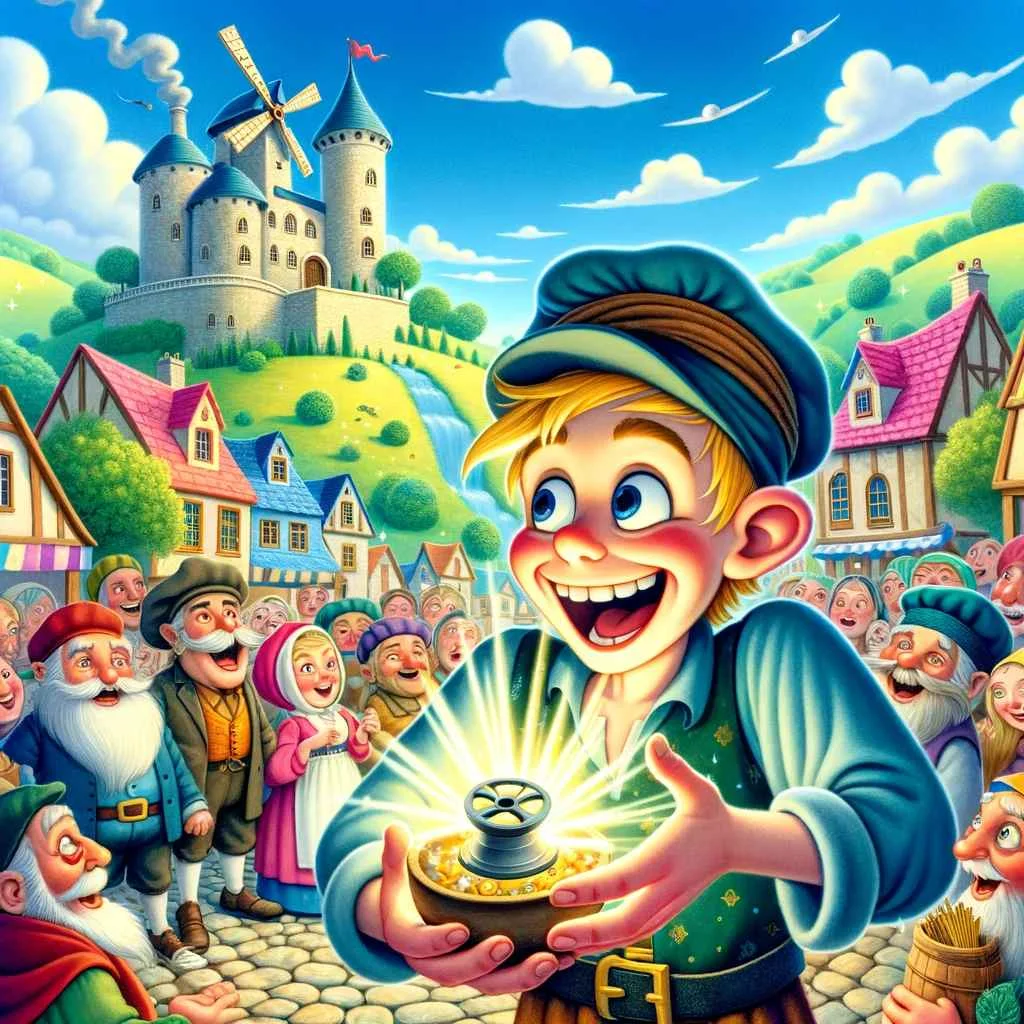“The Little Peasant,” a fairy tale by the Brothers Grimm, showcases the journey of a clever protagonist outsmarting others, embodying the collection’s themes of ingenuity, resourcefulness, and underdog victory. It captivates audiences of all ages with its timeless moral and narrative.
In a distant village, where fortune smiled upon all but one, there lived a peasant so modest in means he was simply known as the little peasant.
Unlike his prosperous neighbors, he owned neither a cow nor the means to acquire one. Yet, he and his wife harbored a deep longing for such a companion.
One day, sparked by a stroke of ingenuity, the little peasant turned to his wife with an idea that shone in his eyes, “My dear, why don’t we have our kinsman, the cabinetmaker, create us a calf from wood? Painted brown, it could pass for the real thing. In time, it’s bound to grow into a cow.”
Delighted by the ingenuity, his wife clapped her hands together, “Oh, what a clever plan! Yes, let’s do that!”
And so, their skilled relative set to work, crafting a wooden calf so lifelike it appeared ready to graze.
When dawn painted the sky the next morning, the little peasant approached the village herder, calf in tow. “Good herder,” he began, “this little calf of mine is yet too frail to walk to pasture. Might you carry it there?”
The herder, though hesitant, couldn’t refuse the earnest request. “Alright, I’ll take your calf,” he said, lifting the wooden animal with a grunt.
As the day waned, the herder, seeing the calf had not moved an inch, decided, “You’ve had your fill, now it’s time to walk on your own. I won’t carry you back.”
That evening, the little peasant awaited their return, only to find his calf missing. “Herder, where’s my calf?” he asked, a frown creasing his brow.
“It’s still out grazing. Refused to come back with us,” the herder replied, scratching his head.
Unsatisfied, the little peasant insisted, “We must find it,” leading to a fruitless search. Convinced of foul play, the matter was taken before the mayor.
Standing firmly in the mayor’s hall, the little peasant declared, “My calf has vanished under his watch.”
The mayor, after hearing both sides, declared, “The herder will compensate for his negligence. You, little peasant, shall receive a cow for your lost calf.”
Though the gift of a cow filled their hearts with joy, the reality of their empty larder soon set in. “We cannot feed her,” the wife lamented, leading to the cow’s eventual butchering.
Intent on trading the hide for a new calf, the little peasant stumbled upon a wounded raven. “Poor creature,” he murmured, gently wrapping it in the cowhide.
Caught in a sudden storm, he sought refuge at a mill. “Might I stay here for the night?” he asked the miller’s wife, who welcomed him with a modest offering of bread and cheese.
But as the night deepened, a secret feast was prepared for an arriving priest, overheard by the little peasant. “Bread and cheese for me, while they feast?” he muttered, indignation bubbling within.
The miller’s return threw the household into disarray. “What’s all this?” the miller barked upon seeing the peasant.
“Oh, just a poor soul seeking shelter from the storm,” his wife explained, her voice laced with feigned innocence.
The miller, spotting the cowhide, inquired, “And what’s this you have?”
“A fortune-teller,” the little peasant quipped, a mischievous glint in his eye.
“Predict something for me,” the miller demanded, intrigued.
As the raven inside the hide cawed, the little peasant announced, “It speaks of wine hidden under your pillow, and a roast within the stove.”
With each “prediction” proving true, the miller grew more amazed, eventually demanding the fifth and final secret. The little peasant, pressing the raven once more, declared, “It warns of a devil in your hallway chest.”
The revelation led to the priest’s hurried escape, the miller’s bewilderment, and the peasant’s clever departure with a hefty sum.
As the little peasant’s fortunes rose, so did the envy of his neighbors. Their attempt to replicate his success by selling their cow hides led only to disappointment and a collective call for retribution.
Facing a grim sentence, the little peasant’s quick thinking saw him trick a shepherd into taking his place in the barrel, securing not only his freedom but also a flock of sheep.
As the villagers met their watery fate, chasing after illusions of underwater sheep, the little peasant stood as the sole survivor and heir to the village’s wealth.
The little peasant, having amassed wealth through wit and deceit, feels the heavy solitude of being the richest man in an empty village, realizing that true value lies in community rather than gold alone.
He resolves to use his fortune to rebuild the village, focusing on creating a community where prosperity is shared and the bonds between people are valued.
Follow Up Questions
Why did the little peasant decide to make a calf out of wood?
How did the little peasant trick the herder and the mayor?
What lesson did the little peasant learn about wealth and community by the end of the story?
Also Read: The Bremen Town Musicians – The Green Serpent

